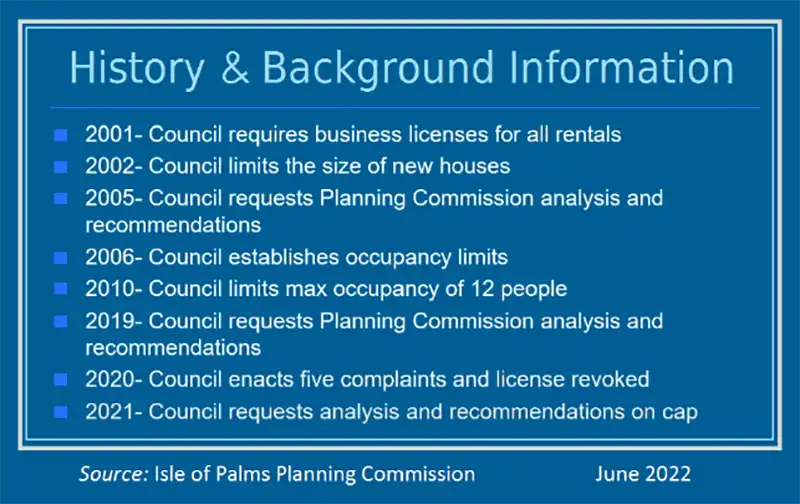
A proposal to limit short-term rental licenses (STRL) for properties on the Isle of Palms has created two sharply divided camps. And now, with the issue coming to a head after many months of resident input and council deliberation, it will be settled in a referendum on the Nov. 7 election ballot.
“Balancing short-term rentals, residential areas and day visitors has been an issue for as long as IOP has been around,” said IOP Mayor Phillip Pounds. “This city council has been reviewing the issues and alternatives for over a year.”
Island leaders and residents favoring STRL limits insist the measure will maintain both a quality of life and commercial income. Those against the limits are adamant that in the long run such a measure will do more commercial harm than good for the island’s economy and resident population.
“I have no idea what our voters will decide,” Pounds added. “But city council’s job is to implement the direction of the residents based on the outcome of the vote.”
Root of the Issue
Island rentals, of course, are a main part of IOP’s regular economy, as its attraction as a South Carolina vacation spot has been in place since the McKinley presidency.
During the height of the tourist season, in the summer months, the number of island visitors can reach as high as 20,000 per day – more than four times the 4,261 permanent residencies, according to Pounds. But the roots of the STRL issue are much more recent and traceable to 2001, when city council first required business licenses for all short-term rentals.
Since then, policies have been modified to include occupancy limits, new home sizes and three requests by the city council for analysis and recommendations from the IOP Planning Commission – the last one coming in 2019 regarding an STRL cap. And the major portion of the STRL issue has come about during a long period of flux in island residency.
Regardless of the island’s actual population, the Charleston County Property Tax Records show that as of Sept. 7, 2023, the number of short-term rentals on all 6% IOP investment properties – on which a cap would be applied – amounted to 1,616 – only 16 more than the cap listed in the referendum.
Douglas Kerr, director of IOP Building, Planning and Zoning, has pointed out in public presentations that, based on extensive research, both residents and council should consider establishing a cap in areas where STRLs are already low; and, for areas where STRLs are more prevalent, to continue to let the market decide.
Petition for a Cap
On Feb. 28, 2023, the IOP City Council voted 5-4 against an island- wide cap on STRLs, opting instead to increase law enforcement efforts governing STRL properties. The vote came eight months after the city’s planning commission suggested a cap only in areas where STRL demand is low, such as single-family neighborhoods.
But when 1,173 residents signed a petition protesting the council’s vote, and favoring an island-wide cap, their action brought about a special city council meeting on July 11. At this meeting, council members heard resident comments and discussed whether to adopt an ordinance upholding the petition. Again, the council voted 5-4 against an ordinance to adopt an island-wide cap. Those opposed were Pounds and council members Jimmy Ward, Rusty Streetman, Blair Hahn and Kevin Popson. Those in favor were council members John Bogosian, Katie Miars, Jan Anderson and Scott Pierce.
Their vote prompted the November referendum and its question, per the wording of the resident petition: Shall the City of Isle of Palms limit the investment of short-term rental business licenses to a maximum of 1,600?
Yes: In favor of the short-term rental cap.
No: Opposed to the short-term rental cap.
Possible Outcomes
If a yes vote wins, then the number of STRLs would then be limited to 1,600 for all 6% taxable investment properties, per IOP’s business license rental year, which runs May 1 to April 30. The 1,600 figure represents 34.9% of the island’s 4,584 current dwelling units, according to Charleston County property tax records for September 2023.
If a no vote wins, then all island parcels – including residential (4% taxable) and IOP investment (6% taxable) – would be able to get shortterm rental licenses.
Both Sides of the Aisle
At the July 11 meeting, residents Bruce Council and Elizabeth Campsen were among those in favor of a short-term rental cap. “Residents want, and expect, to be protected from an unlimited number of short-term rentals,” Campsen said. “And this desire is completely in line with the first priority and goal of our strategic plan, reducing the impact of tourism on the quality of life for residents.”
Residents Laura Lovins and Thomas Schmidt spoke in favor of a cap – with Lovins saying, “1,173 of your neighbors and constituents have made their voices clear.”
On the other side,Terri Haack, speaking on behalf of Wild Dunes LLC, said an island-wide cap would jeopardize “the vitality of the island’s economy.”
“The STR cap, as currently proposed by a few permanent IOP residents, violates property rights, will negatively impact the island’s economy for years to come and threatens residential property values across the community,” Haack said.
Reiterating her stance before council at the July 11 meeting, Haack later added that two-thirds of IOP property owners will not have a say in this decision that directly impacts the value of their investments. The reason being because they’re not full-time residents and therefore ineligible to vote.
“In addition to the loss of accommodation and hospitality tax revenue that will naturally result from a reduction in STR licenses, a large part of property value on IOP is the ability to offset the cost of a second home by short-term renting it,” Haack added. “Without the ability to short-term rent, a property is simply not worth as much to potential buyers.”
Councilman Rusty Streetman concurred, adding that an island-wide cap at this point would tend to negatively affect property values for resale and “hurt our economy now and in the long run.”
Regardless of whichever camp you agree with, the message from both sides is clear: Get out and make your vote count.
By L. C. Leach III




Leave a Reply